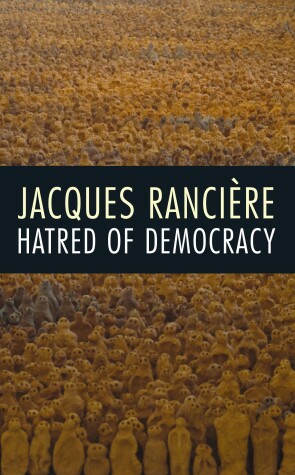Radical Thinkers
2 total works
It is frequently said that we are living through the end of politics, the end of social upheavals, the end of utopian folly. Consensual realism is the order of the day. But political realists, remarks Jacques Ranciere, are always several steps behind reality, and the only thing which may come to an end with their dominance is democracy. 'We could', he suggests, 'merely smile at the duplicity of the conclusion/suppression of politics which is simultaneously a suppression/conclusion of philosophy.' This is precisely the task which Ranciere undertakes in these subtle and perceptive essays. He argues persuasively that since Plato and Aristotle politics has always constructed itself as the art of ending politics, that realism is itself utopian, and that what has succeeded the polemical forms of class struggle is not the wisdom of a new millennium but the return of old fears, criminality and chaos.
Whether he is discussing the confrontation between Mitterrand and Chirac, French working-class discourse after the 1830 revolution, or the ideology of recent student mobilizations, his aim is to restore philosophy to politics and give politics back its original and necessary meaning: the organization of dissent.
Whether he is discussing the confrontation between Mitterrand and Chirac, French working-class discourse after the 1830 revolution, or the ideology of recent student mobilizations, his aim is to restore philosophy to politics and give politics back its original and necessary meaning: the organization of dissent.
This title offers a vehement defense of the principle of democracy against neoconservative repression. Jacques Ranciere argues that the West can no longer simply extol the virtues of democracy by contrasting it with the horrors of totalitarianism. As certain governments are exporting democracy by brute force, and a reactionary strand in mainstream political opinion is willing to abandon civil liberties and destroy collective values of equality, Ranciere explains how democracy - government by all - attacks any form of power based on the superiority of an elite. Hence the fear, and consequently the hatred, of democracy amongst the new ruling class. In a compelling and timely analysis, "Hatred of Democracy" rethinks the subversive power of this democratic ideal.

